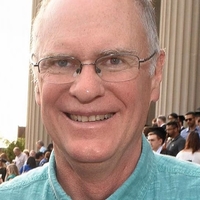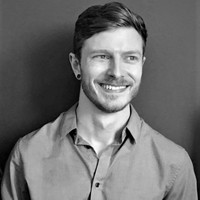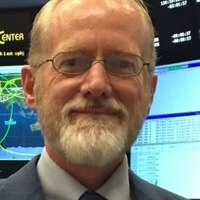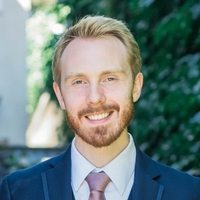Workshop – Cybersickness: Causes and Solutions
Event TypeACM SIGGRAPH Frontiers, Frontiers Workshop
Gaming & Interactive
New Technologies
Research & Education
Gaming & Interactive
TimeSunday, 28 July 20199am - 5pm
LocationRoom 507
DescriptionThe primary purpose of the workshop is to improve the understanding of and discuss potential solutions for cybersickness, the motion sickness associated with immersive environments. The workshop will be a full-day deep dive into cybersickness, including review of the challenges XR technology pose to human physiology, the magnitude of the problem, (variability in) susceptibility, and decay rates. Participants will help in devising potential solutions and developing a Cybersickness Research Roadmap that identifies critical, cybersickness-relevant research questions that need to be addressed in order to realize the safe and effective proliferation of XR technology.
Cybersickness: Causes and Solutions
Organizers
Bas Rokers
Kay Stanney
Presenters
Bas Rokers
Cali Fidopiastis
Thomas Stoffregen
Mark Dennison
Ben Lawson
Séamas Weech
Event Type
ACM SIGGRAPH Frontiers
Frontiers Workshop
Gaming & Interactive
New Technologies
Research & Education
Gaming & Interactive
TimeSunday, 28 July 20199am - 5pm
LocationRoom 507
DescriptionThe primary purpose of the workshop is to improve the understanding of and discuss potential solutions for cybersickness, the motion sickness associated with immersive environments. The workshop will be a full-day deep dive into cybersickness, including review of the challenges XR technology pose to human physiology, the magnitude of the problem, (variability in) susceptibility, and decay rates. Participants will help in devising potential solutions and developing a Cybersickness Research Roadmap that identifies critical, cybersickness-relevant research questions that need to be addressed in order to realize the safe and effective proliferation of XR technology.
Talks:
Talks:
- Predicting and Preventing Cybersickness - Bas Rokers
- Human System Adaptation and its Significance to Extended Realities - Cali Fidopiastis
- Postural instability and cybersickness - Thomas Stoffregen
- Implications of motion sickness for military operations: from training to the battlefield - Mark Dennison
- A Reconsideration of Some Factors Thought to Contribute to Sickness During Real or Apparent Motion - Benton Lawson
- Multisensory reweighting and cybersickness - Seamas Weech
Organizers

Bas Rokers
New York University
Bas Rokers is Associate Professor and Director of the Neuroimaging Center at New York University - Abu Dhabi. His work aims to uncover the neural basis of visual perception, with an emphasis on motion and depth perception. He has held visiting positions at Utrecht University, in the Netherlands, the Massachusetts Institute of Technology, and New York University. In addition to basic research, he has contributed to science education through the Wisconsin Virtual Brain Project and the National Geographic television series Brain Games.

Kay Stanney
Design Interactive, Inc.
Dr. Kay M. Stanney is CEO and Founder of Design Interactive (DI), Inc., a 70+ person company that has been focusing on empowering people through innovative solutions since 1998. In 2019, she was inducted into the National Academy of Engineering (NAE) for her contributions to “human factors engineering through virtual reality technology and strategic leadership.” She works with the DoD and Fortune 100 companies to harness the power of interactive technology to help people realize their full potential. She is a forward-looking leader, known for selecting, developing and mentoring high-potential emerging thought leaders. During her 25+ years of carrying out research in the area of immersive training, she has led numerous efforts involved in furthering adaptive immersive training techniques. Her research has influenced the design of current generation virtual reality (VR) headsets, military training solutions, amusement park rides, and Fortune 100 enterprise solutions. Dr. Stanney received a B.S. in Industrial Engineering from the State University of New York at Buffalo in 1986, after which time she spent three years working as a manufacturing/quality engineer for Intel Corporation in Santa Clara, California. She received her Masters and Ph.D. in Industrial Engineering, with a focus on Human Factors Engineering, from Purdue University in 1990 and 1992, respectively, after which time she spent 15 years as an Industrial Engineering professor at the University of Central Florida (UCF).
Presenters

Bas Rokers
New York University
Predicting and Preventing Cybersickness
Bas Rokers is Associate Professor and Director of the Neuroimaging Center at New York University - Abu Dhabi. His work aims to uncover the neural basis of visual perception, with an emphasis on motion and depth perception. He has held visiting positions at Utrecht University, in the Netherlands, the Massachusetts Institute of Technology, and New York University. In addition to basic research, he has contributed to science education through the Wisconsin Virtual Brain Project and the National Geographic television series Brain Games.

Cali Fidopiastis
Design Interactive Inc.
Dr. Cali Fidopiastis is a Chief Scientist at Design Interactive, Inc. and is a specialist in human-system integration, psychophysics benchmarking of Virtual Environments, design and development of Augmented Reality training systems, biological systems modeling, and data analytics. Over the past 15 years, she developed a user-centered methodology for evaluating human perceptual issues in Extended Reality (xR) spaces. Cali conducted her PhD research in Modeling and Simulation under the guidance of Jannick Rolland, a world leader in head-worn display design, at the University of Central Florida. The result of her work was a psychophysical assessment test battery for evaluating virtual environment applications for operational tasks. She has applied this methodology to designing mixed reality rehabilitation protocols, as well as augmented reality based battlefield medic training. She also completed her studies in vision science and applied neuroscience at the University of Irvine with emphasis on active vision, visual illusions, and mechanisms of brain plasticity.

Thomas Stoffregen
University of Minnesota
Tom Stoffregen is a Professor of Kinesiology and Director of the Affordance Perception-Action Laboratory at the University of Minnesota. He is a student of the Ecological Approach to Perception and Action. His research extends from the kinematics of body sway to the perception of affordances and theories of the nature of perceptual information. Since 1991, he has studied motion sickness in the laboratory, in human-computer interaction, and at sea. His work has been profiled in the New York Times, The Wall Street Journal, Le Figaro, Scientific American, and many other media organizations. His research has been funded by NIH, the Spencer Foundation, and the European Commission. His current research on motion sickness in head-mounted displays is funded by NSF.

Mark Dennison
U.S. Army Research Laboratory West
Mark Dennison is a research psychologist with the CCDC Army Research Laboratory in the Computational and Information Sciences Directorate, Battlefield Information Processing Branch. Dr. Dennison’s research focuses on using virtual, augmented, and mixed reality technologies to improve human-information interaction and enhance decision-making. He has worked extensively with EEG and peripheral physiological sensor systems to study motion sickness and other effects of head-mounted display use on humans. Dr. Dennison graduated with a bachelor’s degree in psychology, a master’s degree in cognitive neuroscience, and a Ph.D. in
psychology, all from the University of California at Irvine. He is stationed at ARL-West in Playa
Vista, CA, and also works as an assistant project scientist in the Department of Cognitive
Sciences at UC Irvine.

Ben Lawson
Lawson Consulting
Ben Lawson is a sensory psychologist who has studied spatial orientation, motion maladaptation, postural equilibrium, vestibular function, cognitive/psychomotor performance, simulated/virtual environments, human factors, and pharmacological countermeasures. His main overlap with the current panel is his interest in motion sickness symptomatology. Ben has 26 years of research experience on human performance topics of military relevance. He has served as an Adjunct Prof. of Applied Psychology (University of West Florida), of Human Factors (Embry-Riddle), and of Military Medicine (USUHS). He has served on editorial & advisory boards for books, symposia, journals, and proposal review committees, and staged conferences and workshops on spatial orientation. He holds a BSci in biological psychology (UC Davis) and PhD in experimental psychology.

Séamas Weech
University of Waterloo
Séamas Weech is a postdoctoral researcher in the Multisensory Brain and Cognition Lab at the University of Waterloo. He is funded by Oculus Research/Facebook Reality Labs to examine how the central nervous system responds to the highly unfamiliar sensory conditions of virtual reality, with a special focus on the impact of visual-vestibular interactions on cybersickness susceptibility. His published work covers methods of both predicting and counteracting cybersickness. He recently received a fellowship from the National Science and Engineering Research Council of Canada (NSERC) to continue to study these questions at McGill University. He holds a PhD and MSc from Queen’s University, Canada, and a BSc from Queen’s University, UK.


